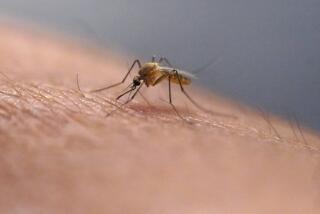Rare New Hazard Threatens New Yorkers
- Share via
NEW YORK — In New York City, where murder is down and the quality of life is up, there’s suddenly a deadly new menace: mosquitoes.
Three people have died in the last few weeks in an outbreak of mosquito-borne encephalitis, an inflammation of the brain. Nine other people have been infected, and 60 possible cases are being investigated.
Health officials in helicopters and on foot began spraying pesticide around the city last weekend to prevent the spread of the disease.
Mayor Rudolph W. Giuliani said Thursday that forested and swampy areas in the entire city will be sprayed over the next several days and sporadically for the next several weeks, until frost sets in, and again in the spring.
The spraying is aimed at stagnant pools of water where the insects breed.
“The more dead mosquitoes, the better,” Giuliani said.
Roger Nasci, an entomologist for the national Centers for Disease Control and Prevention, said it is “exceedingly rare” for the disease to hit a Northeastern city and blamed “bad luck” for the outbreak.
It was New York’s first confirmed outbreak of the disease, a strain known as St. Louis encephalitis. One confirmed case was in the borough of Brooklyn; the rest have been in Queens.
The disease originates in birds, which pass it to mosquitoes that feed on their blood. Mosquitoes then transmit it to humans. It cannot be transferred between humans.
A city hotline has been flooded with more than 13,000 calls since word of the illness emerged, but people relaxing in Flushing Meadows park in Queens seemed unconcerned Thursday afternoon, even though the park was one of the first areas targeted as a possible breeding ground for mosquitoes.
“If I was meant to die by a mosquito, I would have died already,” said sunbather Anthony Ferro, 35.
Jim Guerin, 55, was catching some sun and enjoying a barbecue with his wife. Neither was wearing bug spray.
“There’s not that many good days left in the summer,” Guerin said. “It’s a concern of ours, but [the illness] is not a priority.”
The disease is often treatable, but it can kill children, the elderly and anyone with immune system problems.
The symptoms, which generally appear five to 15 days after a bite, include fever and headaches.
More to Read
Sign up for Essential California
The most important California stories and recommendations in your inbox every morning.
You may occasionally receive promotional content from the Los Angeles Times.








